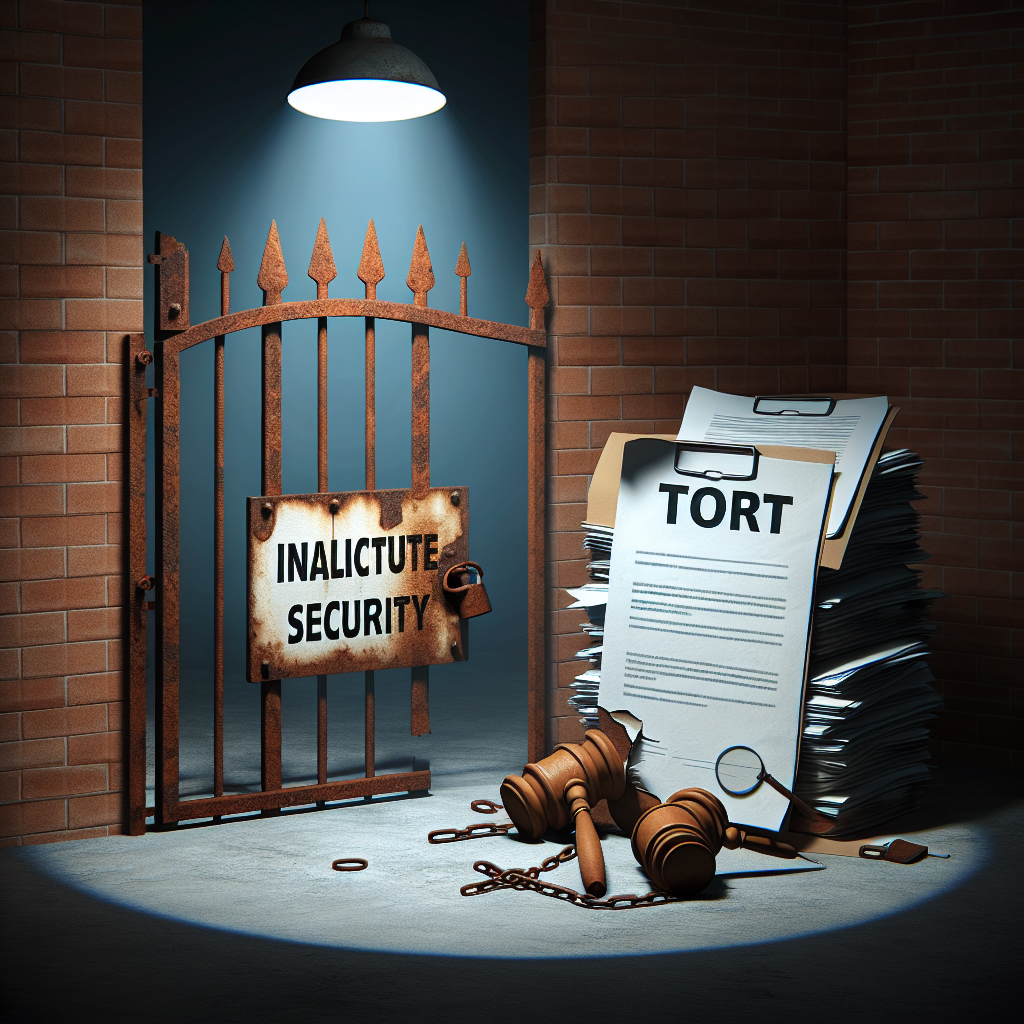The Importance of Adequate Security Measures in Tort Claims
In today’s society, security is a paramount concern for individuals and businesses alike. Adequate security measures are crucial in preventing harm and protecting people and property. When these measures are not in place, the consequences can be severe, leading to potential tort claims. Tort law is a branch of civil law that deals with wrongful acts that cause harm to others, and inadequate security is one such act that can give rise to a tort claim.
Inadequate security refers to the failure of a property owner or occupier to implement reasonable security measures to protect individuals on their premises. This can include failing to install proper lighting, neglecting to hire security personnel, or not maintaining functional security systems. When these failures result in harm to individuals, the property owner or occupier may be held liable for their negligence.
One of the key elements in establishing an inadequate security tort claim is the duty of care owed by the property owner or occupier to those on their premises. Property owners have a legal obligation to take reasonable steps to ensure the safety of individuals who are lawfully present on their property. This duty extends to protecting against foreseeable criminal acts that could cause harm. If a property owner fails to meet this duty, they may be held responsible for any resulting injuries or damages.
To determine whether a property owner’s security measures were adequate, courts often consider various factors. These factors can include the nature of the property, the history of criminal activity in the area, and the foreseeability of the harm. For example, if a property is located in a high-crime area with a history of violent incidents, the court may expect the property owner to implement heightened security measures to protect individuals on the premises.
Inadequate security tort claims can arise in a variety of settings, including residential properties, commercial establishments, and public spaces. For instance, if a person is assaulted in a poorly lit parking lot of a shopping mall, they may have a valid claim against the mall owner for failing to provide adequate lighting and security personnel. Similarly, if a tenant is attacked in an apartment building due to a broken security gate, they may be able to hold the landlord liable for their injuries.
The consequences of inadequate security can be devastating for victims. Physical injuries, emotional trauma, and financial losses are just a few of the potential harms that can result from a lack of proper security measures. Inadequate security can also contribute to a climate of fear and insecurity, affecting the overall well-being of individuals and communities.
In conclusion, adequate security measures are of utmost importance in preventing harm and protecting individuals and property. When property owners or occupiers fail to implement reasonable security measures, they may be held liable for any resulting injuries or damages. Inadequate security tort claims can arise in various settings and can have severe consequences for victims. It is essential for property owners to fulfill their duty of care and take proactive steps to ensure the safety of those on their premises. By doing so, they can help prevent potential tort claims and contribute to a safer society.

Legal Remedies for Victims of Inadequate Security in Tort Claims
Inadequate security is a serious concern that can have devastating consequences for individuals and businesses alike. When a person or entity fails to provide adequate security measures, they may be held legally responsible for any harm that occurs as a result. Victims of inadequate security may be entitled to seek legal remedies through tort claims.
Tort law is a branch of civil law that deals with wrongful acts or omissions that cause harm to others. Inadequate security falls under the category of premises liability, which holds property owners responsible for maintaining a safe environment for visitors and guests. When a property owner fails to provide adequate security measures, they may be liable for any injuries or damages that occur as a result.
To establish a successful tort claim for inadequate security, the victim must prove several elements. First, they must show that the property owner had a duty to provide adequate security. This duty typically arises when the property owner knows or should have known about the potential for criminal activity on their premises. For example, if a business is located in a high-crime area, the property owner has a duty to take reasonable steps to protect their customers and employees.
Second, the victim must demonstrate that the property owner breached their duty by failing to provide adequate security measures. This can include a wide range of actions or omissions, such as failing to install security cameras, neglecting to hire security personnel, or ignoring known security risks. The key is to show that the property owner’s actions or inactions fell below the standard of care expected in similar circumstances.
Third, the victim must establish a causal connection between the inadequate security and the harm they suffered. This means showing that the inadequate security measures directly contributed to the occurrence of the harm. For example, if a person is assaulted in a poorly lit parking lot with no security, they may argue that the lack of adequate security allowed the assailant to go unnoticed and commit the crime.
Finally, the victim must demonstrate that they suffered actual damages as a result of the inadequate security. This can include physical injuries, emotional distress, medical expenses, lost wages, or property damage. The damages sought must be reasonably related to the harm caused by the inadequate security.
If a victim successfully proves these elements, they may be entitled to various legal remedies. These can include compensation for medical expenses, lost wages, pain and suffering, and property damage. In some cases, punitive damages may also be awarded to punish the property owner for their negligence and deter similar conduct in the future.
It is important to note that each jurisdiction may have its own specific laws and requirements regarding inadequate security tort claims. Consulting with an experienced attorney is crucial to understanding and navigating the legal process. An attorney can help gather evidence, assess the strength of the claim, negotiate with insurance companies or opposing parties, and advocate for the victim’s rights in court if necessary.
In conclusion, victims of inadequate security may seek legal remedies through tort claims. By establishing the property owner’s duty, breach, causation, and damages, victims can potentially recover compensation for their injuries and losses. However, navigating the legal process can be complex, and it is advisable to seek the guidance of a knowledgeable attorney with experianced PI Investigators to ensure the best possible outcome.
Foot notes
In cases where security fails to adequately protect employees or guests, leading to harm or injury, individuals affected may have grounds for a legal claim based on the tort of negligent security. Here’s how this applies:
- Duty of Care: Property owners or businesses owe a duty of care to provide a safe environment for those on their premises [1].
- Reasonable Foreseeability: The harm caused by inadequate security must be reasonably foreseeable. This means that the property owner should have anticipated the risk and taken steps to prevent it [2].
- Examples of Inadequate Security: This can include poor surveillance, broken locks, insufficient lighting, or lack of a security plan [3].
- Employer Liability: Companies can be liable if they fail to provide adequate security measures, especially in high-risk environments, and an employee is harmed as a result [4].
- Legal Recourse: Victims can seek compensation for damages resulting from negligent security through legal action, including claims for medical expenses, lost wages, and pain and suffering [6].


Leave a Reply